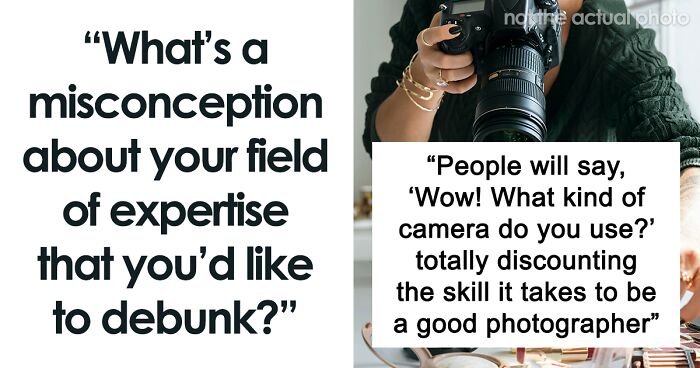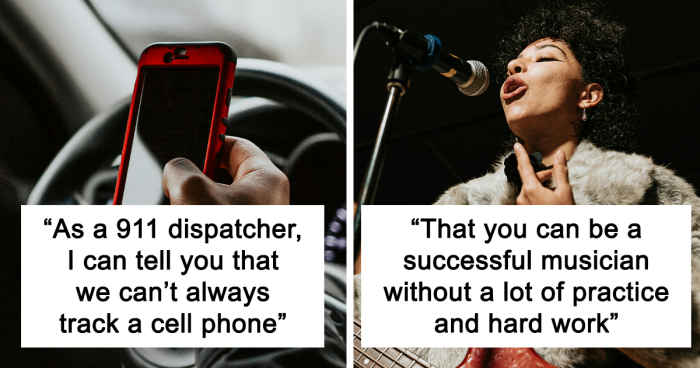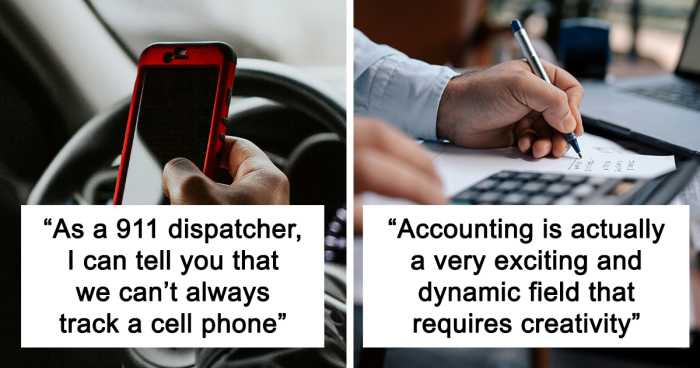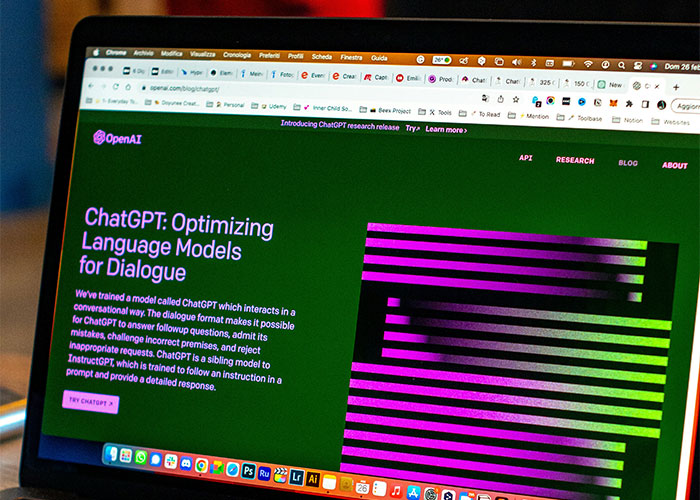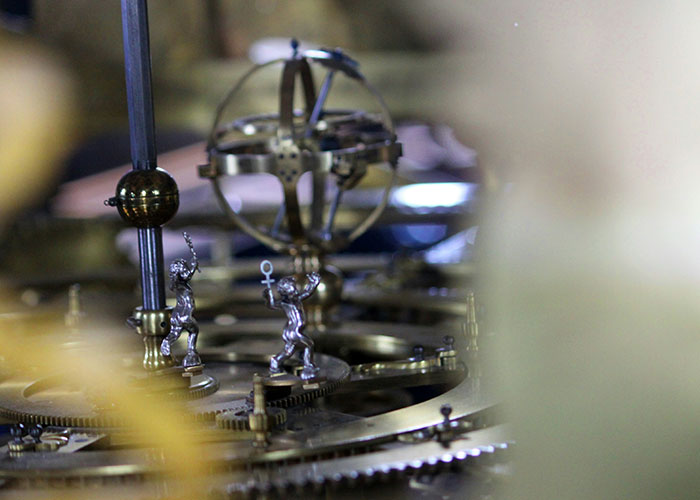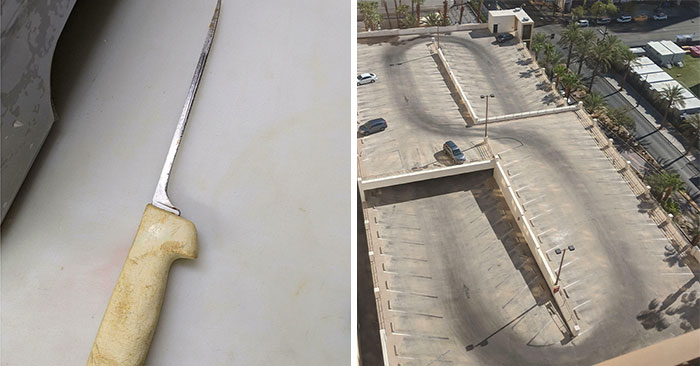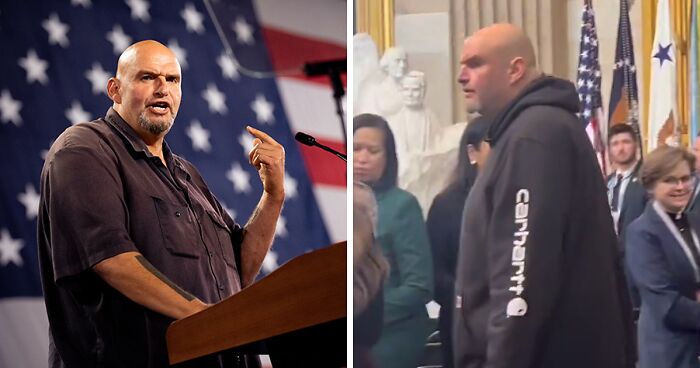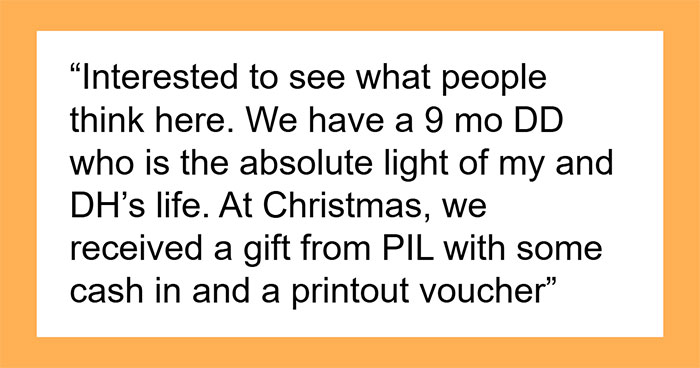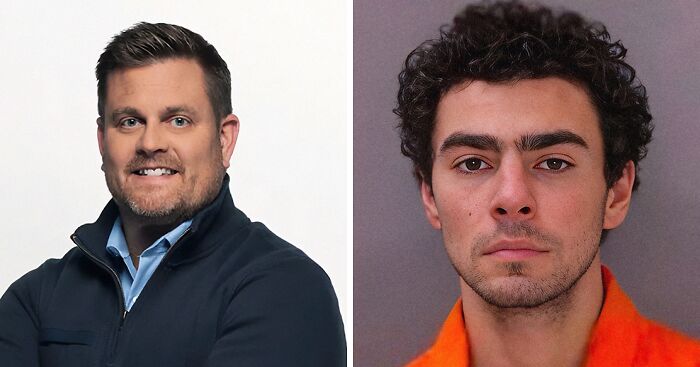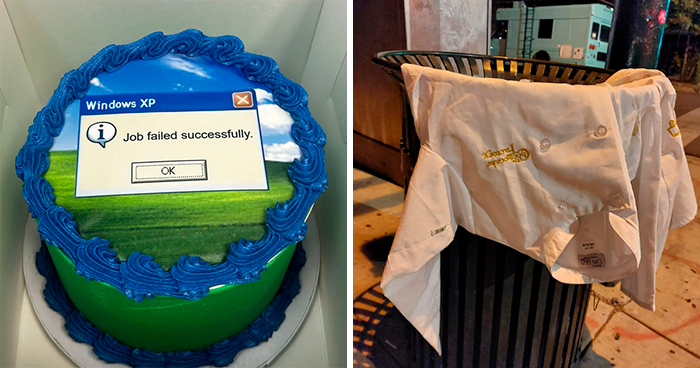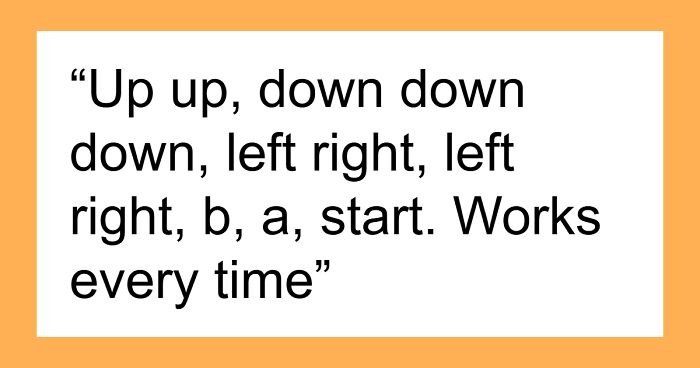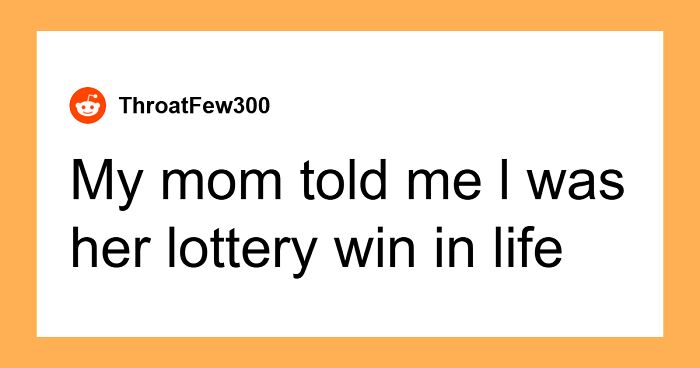
“What’s A Misconception About Your Profession That You’d Like To Debunk?” (30 Answers)
Interview With ExpertWhen you’ve got years or even decades of experience in your career, you can sometimes forget that not everyone is aware of all the nuances of what your job involves. Things that look and sound intuitive to you might be a complete mystery to someone else. In short, while you’ve been in the (metaphorical) trenches, others may romanticize what you do or unfairly criticize your work.
Today, we’re looking at some of the most viral threads on Quora, where professionals debunked common myths and popular misconceptions about their jobs. We’ve collected some of their best insights to share with you, so continue scrolling to check them out. If you think that trying to make it as a book writer is easy or that construction workers are all 'lazy,' this is your wake-up call.
Bored Panda reached out to personal finance expert Sam Dogen, the founder of Financial Samurai and the author of Millionaire Milestones: Easy Steps to Seven Figures, which comes out in May 2025. He shared his thoughts on why people romanticize careers other than their own, what young people new to the job market should keep in mind, and what aspiring book writers should do. You'll find our interview with Dogen below.
This post may include affiliate links.
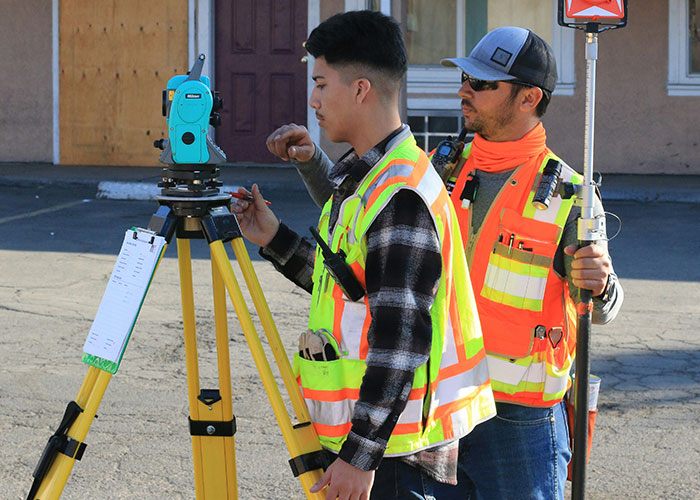 The myth I want to dispel is that construction workers just stand around doing nothing - especially when patching potholes.
The myth I want to dispel is that construction workers just stand around doing nothing - especially when patching potholes.
Okay, I have actually tried to dispel this myth before and have received massive amounts of pushback, but I guess I’ll just keep slamming my head into a wall on this issue.
When a crew goes out to patch a pothole (and there are a lot of potholes in my area due to the rapid freeze-thaw cycle), they need to set up traffic control around the area, then clean out the pothole to be filled. They remove dirt and debris (mostly trash and leaves), and then chip the surrounding material back to “good pavement”.
Once that is done, THEN they can call for the fill material - and until the fill material arrives they have to WAIT.
Why? Well, for one thing, the fill has to be mixed up fresh at the plant, and then it has a very limited shelf-life. They can’t call for it until they know exactly how much they need, and they can’t call ahead of time because once the mix cools down it is useless - unless it is in the patch. So they can’t just order more than they need because where are they going to dispose of the excess? Not to mention that asphalt isn’t exactly cheap.
They can’t leave and start cleaning a new pothole because drivers WILL ignore the traffic cones and drive into the hole. Also, with traffic going by, more debris will end up in the hole, blown by the drafts caused by passing cars. So they have one guy watching the traffic and another guy making sure the hole stays clean and the rest of the crew cleans up their tools and get ready for the hot asphalt mix to arrive. The crew chief fills out the necessary paperwork, but they are usually sitting in the truck, at least. (The crew is usually only 4 guys, including the chief, anyway.)
When the mix arrives, they fill the pothole (possibly in several layers), compact the material and protect it while it cools so some idiot driver doesn’t drive over the fresh (hot) patch, melting their tires into the asphalt and damaging both tires and patch.
As they wait for the patch to cool/ cure, they clean their tools again (asphalt is sticky and you can’t get it off once it has hardened), then race off to do the next pothole.
It is hard labor and takes real strength and stamina to do. But the drivers going past are mad at the inconvenience (and would be even angrier if the potholes didn’t get patched) and often yell offensive things like, “get back to work!” when the men ARE working - but not actually using a pick or a shovel. Measuring the holes, checking the surrounding material and ensuring the patch takes *IS* real work.
I’ve heard the same complaint while waiting for the next concrete truck (which is especially fun when the truck is caught in traffic because of the idiot drivers who have to slow down to yell at the “lazy” construction workers) or basically any construction that occurs near traffic. “New” construction or construction on roads that are closed are so much calmer and easier to work.
So, construction workers who don’t appear to be “working” (i.e.: they aren’t swinging a pick, sledgehammer or shovel) aren’t “lazy” - there are other parts to their job that take more skill than muscle. And I challenge anyone who yells, “Get back to work,” at a construction worker to swing a pick, sledgehammer or shovel for fifteen minutes straight and find out just how important it is to have some rest periods in between.
Dogen explained to Bored Panda that the reason people often romanticize other careers is because they only see the highlights—not the hustle. "Social media and stories from friends can create a filtered reality where every job appears glamorous or easy. But behind every success story lies countless hours of grind, sacrifices, and failures that often go unnoticed," he said.
"Take being a writer, for example. Many imagine lounging in a cozy café, effortlessly crafting bestselling novels. In reality, writing demands constant self-doubt, endless rewrites, and long periods of isolation. It’s taken me two-and-a-half years to write my latest book, Millionaire Milestones: Easy Steps to Seven Figures (out May 2025). Who knows if it will be another bestseller? What I do know is I’ve poured everything into it," Dogen shared with us.
"When I started Financial Samurai in July 2009, I didn’t make a dime for two years. Still, I committed to publishing three posts a week for 10 years to see if I could build something meaningful. A decade later, that promise paid off—Financial Samurai is now one of the leading independently-owned personal finance sites, drawing over 1 million organic pageviews a month. The secret to success? Unwavering commitment and consistency."
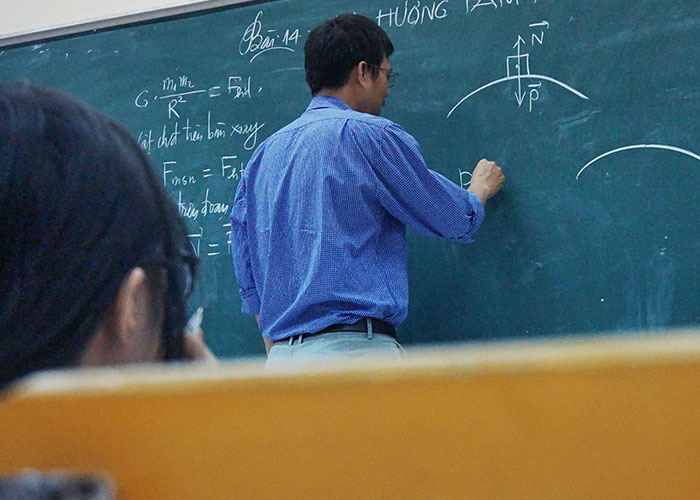 Teachers do not work short hours.
Teachers do not work short hours.
If they are lucky, they have one daily planning period in addition to lunch, but there is no way that all the lessons can be planned and all the homework and tests can be handled in one period per day. Teachers have lots of homework plus grading and record keeping after their normal hours.
Often the “planning period" is used to talk with students having problems or to do tutoring. Sometimes, it's spent observing other teachers in an effort to maintain fresh perspective. Sometimes, it's spent covering for another teacher with a medical or personal emergency where there was no time to recruit a regular substitute.
There are faculty meetings and occasional after school in-service certifications. There are consults with the department chair and administrators regarding student discipline issues. Everything needs to be documented.
(There is never -nor has there ever been - any overtime pay for any of this!)
There are evening parent conferences for which teachers are grateful because it means the student has caring support.
School holidays are catch up for lesson planning, test preparation, grading et cetera.
(There's more, but this is enough to provide a sampling.)
By the way, teachers teach for the love and empowerment of their students.
I'm grateful each and every day for the teachers my children have had. On the whole, teachers are amazing and they are treated far, far too poorly. If you're a teacher seeing this, thank you.
 If you publish a book you’ll be rich.
If you publish a book you’ll be rich.
Statistically you’re more likely to win the lottery. I am one of the very few authors who makes a living writing novels, and it’s not a good living—I earn less than an average fast food worker.
I second this. I have fourteen books published and selling regularly, and they earn less than 300 pounds sterling a year.
Dogen said that romanticizing other careers is a natural way to escape the frustrations of your own job. That being said, no job is 'perfect.' "It’s a powerful reminder that every profession comes with trade-offs. True fulfillment comes from pursuing something that aligns with your values and goals—not chasing someone else’s idealized version of success."
We asked Dogen what advice he'd give young people who are uncertain of which career path they might actually want to take. His advice was to "start broad, but start somewhere." In short, you shouldn't stress out over finding your 'forever job' right away. That would be unrealistic.
"Experiment with different industries and roles to figure out what you enjoy and where your strengths lie. Take on side hustles after your normal working hours to build even more experience. Remember, your first job is just a stepping stone—it doesn’t define your entire career," Dogen told Bored Panda.
"Also, focus on building transferable skills like communication, problem-solving, and emotional intelligence. These will help you pivot to new opportunities as your interests and the job market evolve. Please do not underestimate being a kind and helpful person."
 Being a Science teacher does not mean that you know “everything” about Science. I would need at least 20 different college degrees.
Being a Science teacher does not mean that you know “everything” about Science. I would need at least 20 different college degrees.
It's not the 18th century anymore with people being universal scholars. (probably not even then was it the case)
 Restaurant Manager. That we will spit in or tamper with your food if you upset us.
Restaurant Manager. That we will spit in or tamper with your food if you upset us.
Some people are absolutely paranoid to ask for special requests or to send their food back if it isn't what they expected it to be, worried that we will spit or otherwise soil their food. I have worked in over a dozen different restaurants and I have literally not seen this happen even once. Asking my fellow employees, they all say the same thing. We get a thousand special requests a day. It's part of the job. Even if you ask for something weird and annoying, if it's possible, we'll do it no questions asked.
I once had a lady ask for three different sauces on her pizza and wanted us to build dough walls to separate them. I had a guy who insisted that his steak be perfectly square because someone once told him that all the most tender steaks are square (protip: square steaks are no more tender than other steaks; look for good marbleization instead). Your request probably isn't that weird anyway.
Besides, as a manager, if I ever even thought one of my cooks was doing something as disgusting as tampering with someone's food, I would show them the door that very second. It's just not worth getting your restaurant shut down and everyone losing their jobs for nothing more than a cheap, mean-spirited laugh.
 It’s easy to write books and make a living from writing.
It’s easy to write books and make a living from writing.
FACT: 95% of all writers make less than minimum wage from their writing.
Dogen also had some great tips to share with aspiring bookwriters. He urged them to treat writing like a business. "Writing a book is only part of the equation; marketing, networking, and self-promotion are equally important. Don’t quit your day job until you have consistent income from your writing," he said.
"Write regularly, even if it’s just for 30 minutes a day. Publish blog posts, submit articles, or start a newsletter to build your audience. Your newsletter is one of the most powerful lines of communication with your fans as you build a brand and a following," he said.
"The road to becoming a successful author is long, but if you’re willing to put in the work and stay persistent, it can be deeply rewarding. Most importantly, don’t wait for 'perfect inspiration.' Just start. Every sentence you write is progress."
 Computer science is not the same as IT. Programming is not (usually, in itself) computer science, and neither of these are IT. There’s obviously some overlap in competencies, but they are completely different fields.
Computer science is not the same as IT. Programming is not (usually, in itself) computer science, and neither of these are IT. There’s obviously some overlap in competencies, but they are completely different fields.
Yes, strictly speaking, I can probably fix your computer in the same way that a mathematician can probably help you with your accounting, but it’s not my job, and there are professionals trained to do that.
Similarly, linguistics refers neither to learning foreign languages nor to the study of “proper grammar.”
And then there's Software Engineering. The problem is that if you work in anything to do with computers, then others tend to assume you know everything about them. Whilst we generally know how to fault find problems with computers and printers because we have our own, it is not what we do. Similarly, building a website is a completely different thing than building back end systems or running a mailserver. All are massive subject areas and take a lot of learning (or at least Googling!). We do change as we progress through our careers and bizarrely I now seem to build websites for a living!
 Construction. That it is an unskilled career , that is a gross misconception and a large number in the industry are very skilled , have spent several years in college and many more experienced on site . They have to comply with regulations set down by the industry regulators and there are books of these and updated regularly . A multi skilled person like my self has to know all those regulations and keep up with the modern ones coming in, that is only part of the knowledge required , then there is that of each individual trade and the skill of performing those trades to the meet those regulation standards . An all round builder can be one of the most highly skilled there is having not only the knowledge of different trades but the skill to apply them .
Construction. That it is an unskilled career , that is a gross misconception and a large number in the industry are very skilled , have spent several years in college and many more experienced on site . They have to comply with regulations set down by the industry regulators and there are books of these and updated regularly . A multi skilled person like my self has to know all those regulations and keep up with the modern ones coming in, that is only part of the knowledge required , then there is that of each individual trade and the skill of performing those trades to the meet those regulation standards . An all round builder can be one of the most highly skilled there is having not only the knowledge of different trades but the skill to apply them .
To most they are simply a builder and little respect for the skills they have and how they acquired them , but you would be still living in caves if we're not for them . People take construction for granted but there is a great deal of skill involved in its production and knowledge to get it from bare soil to what you see in its completion .
I have been watching various construction crews on youtube, notably Perkins builder brothers. There is a huge amount that goes into the seemingly simple things. Definitely not an unskilled job.
 People will say, “Wow! What a beautiful photograph! What kind of camera do you use?” Totally discounting the skill and knowledge and talent it takes to be a good photographer.
People will say, “Wow! What a beautiful photograph! What kind of camera do you use?” Totally discounting the skill and knowledge and talent it takes to be a good photographer.
To take consistently good photographs, you have to know how to compose a photo, finding just the right angles, whether it’s a portrait or a landscape or architecture, or whatever. You have to understand light and what a difference bright lights at different angles makes or what happens when the sky is overcast or the lighting is otherwise diffused. You have to understand how ISO, shutter speed, aperture, and focal length all work together (or against each other) to affect exposure.
In the hands of a good photographer, as long as the camera doesn’t have a lens that is complete garbage, pretty any camera will take good pictures.
Now, that’s not to discount professional and high end amateur cameras. They definitely make taking photographs easier, especially when your on a hurry. Sports photographers, for example, need to be able to “set it and forget it, when it come to the exposure, using a fast shutter speed so they can focus (pun fully intended) on capturing the action. Portrait and wedding photographers are going to spend money on short telephoto lenses with high end glass to get the most flawless and flattering photos possible without having to spend a lot of time in post correcting aberrations.
But, once again, it’s the photographer that really makes the difference. My 5 year old granddaughter has a little fixed focus digital camera that her mom paid about $35 for. It’s 8MP, so not bad for looking at pix on a computer screen. But if I were to use it, my photos would look so much better than my granddaughter’s because she just points it at something and presses the button whereas I would look at the view screen, compose the photo making sure I’m within optimal distance for the photo to be in focus, check the lighting, and then take the photo.
This story might be apocryphal, but I remember reading that after Ansel Adams finished taking a portrait of a writer, the writer commented “You take such good photos; you must have an amazing camera!” To which Ansel Adams replied, “You write such good books; you must have an amazing pen!”
As per LinkedIn’s annual ‘Jobs on the Rise’ list, the fastest-growing occupations in the United States in 2025 include artificial intelligence (AI) engineers, AI consultants, physical therapists, workforce development managers, and travel advisors.
Event coordinator positions are also in demand in the American labor market, as are directors of development, outside sales representatives, sustainability specialists, and security guards.
Other occupations that made LinkedIn’s list for 2025 include community planners, AI researchers, treasury managers, land agents, grants consultants, directors of employee relations, chief growth officers, bridge engineers, private equity analysts, research librarians, nuclear engineers, advanced practice providers, chief revenue officers, instrumentation and control engineers, and commission managers.
 Linguistics is not about learning as many languages as humanly possible.
Linguistics is not about learning as many languages as humanly possible.
There are people who do that. We call them “polyglots”. Some people are both linguists and polyglots. However, most polyglots are not linguists, and most linguists are not polyglots.
Linguistics is about studying language and how it works. You poke it, trip over it, push it over, split it apart, put it back together, and then let it wander around again and see what it does now. One of the things I love about syntax, for instance, is that papers on it are full of brilliantly absurd sentences that could never happen - McCawley’s F**k you or I’ll take away your teddy bear![1] comes to mind - because you’re trying to figure out why those sentences are so ridiculous. Any English speaker could tell me that “Want you to must that the chair yellow what?” is wrong, but most couldn’t give a general reason without serious thought.
That’s what linguistics deals with. It also deals with how words are put together, where sounds go and what they do, how we make those sounds, how those words and sounds change over time, how and why different people think certain ways of using words and sounds are bad, where the meaning of those words comes from, how that meaning works, and how and where in the brain all that meaning comes from in the first place.
My BIL is an English professor and a linguist. Syntax and semantics is his thing.
 English professors are not all raging atheist Marxists.
English professors are not all raging atheist Marxists.
Half of the people in my department go to church, and lean center-right.
Many of the social-justice oriented or progressive students we teach already had such sympathies before coming to university. I can’t get my students to put away their smartphones in class; I certainly can’t dictate their political beliefs.
Almost like no one knows the difference between social responsibility and socialism
 My expertise is in cognitive psychology, specifically memory. People typically believe that their memories are true representations of events that happened in their lives. This is largely false. Memories recalled from even recent events are not highly accurate in their details, and older memories are largely stories that are somewhat representative of a person’s understanding of events at the time, and very prone to mistakes of both fact and overall significance. Memory is less of a reliable storehouse of facts, and more of a reconstruction of events based on the few facts that may be clearly recalled.
My expertise is in cognitive psychology, specifically memory. People typically believe that their memories are true representations of events that happened in their lives. This is largely false. Memories recalled from even recent events are not highly accurate in their details, and older memories are largely stories that are somewhat representative of a person’s understanding of events at the time, and very prone to mistakes of both fact and overall significance. Memory is less of a reliable storehouse of facts, and more of a reconstruction of events based on the few facts that may be clearly recalled.
We all view events differently. We saw it from a different angle and caught something others didn’t, we come from a different point of view based on our own very unique life experiences. We played a different role, we were younger, we may not have fully comprehended what was going on, we may only have gotten our information about it secondhand, from the news and other people. We also have a tendency to combine things, and fill in gaps with false or imagined information. Some people also embellish or lie. So everyone viewing the exact same event will have a different memory of it, even if only slightly. Even if they really try to be unbiased and stick to facts without filling anything in.
LinkedIn’s editor-at-large for jobs and career development, Andrew Seaman, told CNBC Make It that these jobs reflect two dominant trends currently shaping the labor market in the US. First of all, you can see the growing adoption of AI tech. However, at the same time, you’re also seeing a surge in demand for in-person services and experiences.
“Paying attention to where demand is can help you identify opportunities you might not have considered before, which can help you stand out in a crowded job market. For example, maybe you don’t want to work as a security guard, but if there’s a strong need for security guards, chances are that companies that hire and train security guards will need people to manage their payroll and operations. Ultimately, there’s a wide range of opportunities for those willing to get creative with their careers,” Seaman said.
 As a 911 dispatcher, I can tell you that we can’t always track a cell phone. Many times we can, but not always, and it’s NOTHING like you see on TV or in movies. It depends on several factors and sometimes the ping only gets us to within a few hundred meters of your location, and if it doesn’t ping to what’s called Phase II, the only thing we know is which cell tower your phone is connected to.
As a 911 dispatcher, I can tell you that we can’t always track a cell phone. Many times we can, but not always, and it’s NOTHING like you see on TV or in movies. It depends on several factors and sometimes the ping only gets us to within a few hundred meters of your location, and if it doesn’t ping to what’s called Phase II, the only thing we know is which cell tower your phone is connected to.
There has been some argument about this being correct, so where is what the FCC says. “The plan requires that within two years, carriers must transmit 911 caller position accurate to within 50 meters to the 911 call center in at least 40 percent of cases. Within five years,carriers must transmit that location information accurately within 60 percent of cases.”
So as you can see, calling 911 and not saying anything doesn’t guarantee police officers or medical personal can locate you. They may be able to but they may not be able to.
I know they sure couldn't track my cell phone when I was trying to surreptitiously call while, well, while I was needing help.
 That an electrician is an electrician, when there are so many different types of electrician. Just think, an auto electrician basically wouldn't know where to start in robotics, or an HVAC unit, electronics, machine tool maintenance to name but a very few. Now I'm not putting any down, but each is conversant with their own particular field.
That an electrician is an electrician, when there are so many different types of electrician. Just think, an auto electrician basically wouldn't know where to start in robotics, or an HVAC unit, electronics, machine tool maintenance to name but a very few. Now I'm not putting any down, but each is conversant with their own particular field.
And an Electrician is completely different to an Electrical Engineer. My dad was an Electrical Engineer and was qualified to work on 33kV overhead lines. He still had to hire an electrician to work in the domestic wiring of the house, as he was not qualified to work on it. Yes, he understood the theory of how it all worked, but he hadn't done the certifications to know the code for domestic electrical installations.
 That tenure is a job for life.
That tenure is a job for life.
No. Tenure merely means you cannot be dismissed for teaching or researching something controversial, at least not without a hearing.
However, professors can (and frequently are) dismissed for failure or neglect to do their duties satisfactorily, for breach of contract, for unethical or unprofessional behavior, or simply because of the college’s financial exigency.
"Tenure is a type of academic appointment that protects its holder from being fired or laid off except for cause, or under extraordinary circumstances such as financial exigency or program discontinuation. Academic tenure originated in the United States in the early 20th century, and several other countries have since adopted it. Tenure is a means of defending the principle of academic freedom, which holds that it benefits society in the long run if academics are free to hold and espouse a variety of views, even if the views are unpopular or controversial." - wiki
Statista, reporting on data from the US Bureau of Labor Statistics, noted that some of the most in-demand jobs between 2022 and 2032 are likely to include: home health and personal care aides, software developers, restaurant cooks, stockers and order fillers, registered nurses, hand laborers and freight workers, stock and material movers, general and operations managers, medical and health services managers, and light truck drivers.
In other words, there’s a projected demand for occupations with a focus on healthcare, logistics, leadership, and software.
 Not me but my husband who is a geologist— most people have no clue what he does or even what a geologist is lol He’s even been called a gynaecologist now that one was interesting.
Not me but my husband who is a geologist— most people have no clue what he does or even what a geologist is lol He’s even been called a gynaecologist now that one was interesting.
 I'm an English teacher and many people think if you are a native speaker and have a pulse you can become a teacher of English. .in Japan many are hired for their native skills rather than actual teaching ability. Most decent language teaching jobs require that you know about linguistics, grammar syntax as well as being able to explain and teaching spelling and pronunciation. I teach students as young as four and many of my adult students are false beginners, who cannot speak any foreign language but have studied it at school. Teaching across a language barrier presents its own difficulties. Many teachers here do not speak a foreign language so have no understanding of learning a language and how to teach others.many of my colleagues have Masters and PhDs.
I'm an English teacher and many people think if you are a native speaker and have a pulse you can become a teacher of English. .in Japan many are hired for their native skills rather than actual teaching ability. Most decent language teaching jobs require that you know about linguistics, grammar syntax as well as being able to explain and teaching spelling and pronunciation. I teach students as young as four and many of my adult students are false beginners, who cannot speak any foreign language but have studied it at school. Teaching across a language barrier presents its own difficulties. Many teachers here do not speak a foreign language so have no understanding of learning a language and how to teach others.many of my colleagues have Masters and PhDs.
There is so much more to teaching ESL than just translating words. Many years ago I had a job with several Japanese coworkers. There came a point of significant confusion about the words "before" and "after." If I said "Before I went to the store, I went to the bank" an English speaker would understand that I went to the bank first. But the way the words are used in Japanese, the "before" thing is the store so they understood it to mean that I went to the bank last. We just came up with a workaround of saying "first thing, second thing, etc.." which was fine for us but just goes to show that learning a second language isn't easy and being a native speaker doesn't mean you're fully qualified to teach it.
 Not all salespeople are pushy and self absorbed. Some of us truly feel like we have something worthwhile to offer and love to help people solve real problems. I dislike the stereotypical used car salesperson as much as anyone, so make an effort to be respectful, inquisitive, and kind.
Not all salespeople are pushy and self absorbed. Some of us truly feel like we have something worthwhile to offer and love to help people solve real problems. I dislike the stereotypical used car salesperson as much as anyone, so make an effort to be respectful, inquisitive, and kind.
I worked in retail for 10 years. I was very good in my job, because I was genuinely interested. My job was looking for a good solution or just something nice, this takes a lot of actual listening. People are what makes your job interesting in retail, not the stuff or cleaning the store. I've gotten to know amazing people and their stories. The people who treat you like c**p just because you work in retail are another story and of course the low pay...
Meanwhile, a YouGov poll found that American teenagers typically dream of becoming professional athletes, doctors, nurses, YouTubers, streamers, actors, musicians, professional gamers, and artists.
What are some of the biggest misconceptions that people have about your work, dear Pandas? What was your dream job growing up? What would the ideal job look like for you now? If you had to do it all over again, would you stick to your current career path or try something completely different? Let us know!
 I.T. That we know your password. “Can you tell me what my password is?” No, we can’t, we can’t see it either.
I.T. That we know your password. “Can you tell me what my password is?” No, we can’t, we can’t see it either.
That we are application gurus. If your Excel works, you need to figure out how to insert the pivot table in lite green on the 2,891’st line of the 3rd worksheet.
We just make sure it works.
Having said that - I am an IT guy, and 90% of my speciality is figuring it out. Put on the junior detective hat and figure out what the user is trying to do, and then explaining how to do it to them using small words... I may not know your software, but I can usually figure out how to make it do what you need... Also, let me google that for you...
 Yes. I used to be a very highly ranked competitive shooter. I held the highest ranking in several shooting sports and regularly won shooting matches. People assumed that because I was good with handguns and had a reasonably wide knowledge of them that it meant I knew “everything about guns.”
Yes. I used to be a very highly ranked competitive shooter. I held the highest ranking in several shooting sports and regularly won shooting matches. People assumed that because I was good with handguns and had a reasonably wide knowledge of them that it meant I knew “everything about guns.”
I know very little about shotguns and rifles and have only competed in a few matches where we used those. I know very little about gunsmithing or working on firearms beyond basic maintenance and know very little about tactics other than strategy on how to win shooting matches. I was just a good handgun shooter.
 Anyone can write a product manual or user instructions, why is it a special profession?
Anyone can write a product manual or user instructions, why is it a special profession?
There’s a lot more to this job than you think. Being able to put yourself in another person’s mindset and then write information and specific instructions for them is not an easy task. You have to try and think of every question someone might ask, and everything they might try to do, even though you have warned them that it may be detrimental to their well-being…to the point of potential death. You have to think of every eventuality because the people you are writing for will try to do it. You should also understand that good documentation will help to sell a shady product. People will forgive bad design aspects if the instructions are well written and easy to follow.
I write for warehousing, airport, and parcel systems, down to component level. Operators climbing on conveyors to clear a jam and having ribs broken by speeding packages or baggage is more common than you think. Engineers need to use the correct components to make sure your TV doesn’t blow up when you turn it on. Emergency staff need to know precisely which medications to administer or which equipment settings to use, and which combinations could potentially kill you! They learn about the correct components, combinations, and systems to use from our manuals.
Most engineers HATE documenting their work. We have to learn about what they are doing and then explain it to you. So, whatever the field of study, give your in-house technical writer or documentation specialist a smile of appreciation once in a while, okay. Thanks.
That reminds me of when I was writing instructions for a new machine a work. When I was finished, my boss checked if she would be able to use the machine solely with my instructions. She read the first sentence which explained how to turn the machine on. Then she looked at me, confused, and said, "But it is already turned on?"
 That “Science is hard.”
That “Science is hard.”
Because it turns out that science is not hard. It’s REALLY HARD. At least the “hard sciences.” I took a couple classes in the “soft sciences”, but they were too hard for me.
And it just gets worse and worse. Or better and better, depending on your mindset. How can I put this indelicately.
Are you a nerd? Do you like Studying?
Great!
Because when you become a scientist, all you do is study. And that is the Joy of it.
Science skeptics think science is a belief system like their religion. But every science student in college actually run all the experiments scientists have used through history to prove every step of science. The students actually prove to themselves the truths of science. Religious believers just read the book and blindly accept the dogma.
 Two things:
Two things:
1) That music theory is somehow a bad object, used by the (imaginary) gatekeepers of music to stop the “non-theory” people from gaining access to music. Debunk: music theory is just “how we talk about music” and we need it if we’re going to share it - and our opinions about it - in any meaningful way.
2) That you can be a successful musician without a lot of practice and hard work. Debunk: it may well be true that some people are just “born talented” but that talent will not emerge without a lot of encouragement.
 I am an Assistant Librarian and it's a myth we don't let people talk in the Public Library.
I am an Assistant Librarian and it's a myth we don't let people talk in the Public Library.
University library worker here: We DO tell you to be quiet, but we don’t do so because we’re stuck-up/boring/evil/whatever, we do it because the people sitting next to you are trying to study, write their thesis or similar. For most students, university libraries are an important place for studying/writing in peace.
 Information Technology Network Operations and Admin :
Information Technology Network Operations and Admin :
We can not control the universe through a televion remote : that one is literally from NCIS.
 My job is to monitor compliance with Ontario’s professional engineering laws and, where necessary, collect information for prosecution.
My job is to monitor compliance with Ontario’s professional engineering laws and, where necessary, collect information for prosecution.
And the myth is that convictions and other legal proceedings are quick and relatively inexpensive. We should be able to bring lots of them at a reasonable cost.
Frankly, many of the offences I help prosecute are little more than big traffic tickets. Seriously, the maximum fine for most offences is the same as the fine for driving 50 km/h over the speed limit. Our discipline cases (which I don’t handle) fill boxes. My cases don’t strain the size of a standard legal sized folder. I have literally one case in a box and it was over 100 offences by the same person.
But the logistics are just horrendous. Once, I had to drive 100 miles, with a lawyer in tow, to lay charges. Twice.
Somebody suggested to me the other week that we should bring charges against 400 or so “software engineers” per year. I explained that a single case might cost $20,000. A complicated hard fought case could be $100,000. Simple cases involving a guilty plea can still tie up several hours of a lawyer’s time, and that’s just to prepare for the sentencing hearing.
Once, the lawyer and I drove downtown for a hearing on one of the hottest days of the year. We were, of course, both in our nice suits. The hearing was adjourned. Half a day wasted, but that’s typical.
From the day I lay charges to the day the judge rules is usually 4–6 months. We don’t get priority for court space.
Last month, we were told about the illegal use of our organization’s logo. The informant was upset when, the next day, the logo still hadn’t been removed. We would certainly go to court about that, but trade-mark disputes have to be heard in federal court, which means hiring special counsel, and we might get a hearing date in three months. Best to give the offender a week to remove the logo.
And here’s the kicker - the trial has to be in the place where the offence took place. We’re in Toronto. We get offences in Ottawa (5 hour drive) and Kingston (3 hour drive) quite frequently. That’s a full day for what might be a 2 minute appearance before a justice of the peace. We often hire local counsel to appear for us, but that’s a $500 bill right there.
As I like to say, if you want more prosecutions, I can spend every dollar you give me.
I wasn't aware that there are any general assumptions about monitoring compliance with professional engineering laws
 All cyber security people are hackers/penetration testers. It is simply not true. I mean sometimes it helps, but most of the time you are basically a middle man that does auditing. My typical day is me going in responding to tickets and reading over vulnerability scans. It is a great career path if you realize that what you will be doing isn't hacking all of the time. Unless you are an ethical hacker.
All cyber security people are hackers/penetration testers. It is simply not true. I mean sometimes it helps, but most of the time you are basically a middle man that does auditing. My typical day is me going in responding to tickets and reading over vulnerability scans. It is a great career path if you realize that what you will be doing isn't hacking all of the time. Unless you are an ethical hacker.
Movies have us believe a single hacker can break into the Pentagon in like five minutes.
 Accounting is a boring and dull profession that involves crunching numbers all day long. That's what most people think when they hear the word "accountant". But that's far from the truth. Accounting is actually a very exciting and dynamic field that requires creativity, problem-solving and communication skills. Accountants don't just sit behind desks and stare at spreadsheets. They also interact with clients, analyze data, advise on business decisions and help prevent fraud. Accountants are not nerdy and antisocial. They are fun-loving and sociable people who enjoy working in teams and having a good laugh. Accountants are not all the same. They have different personalities, interests and hobbies. Some accountants are into sports, music or art. Some accountants are adventurous, outgoing or quirky. Some accountants even have tattoos or piercings. Accounting is not a one-size-fits-all profession. It offers a variety of career paths and opportunities for growth and development. Accountants can work in different industries, sectors and countries. They can specialize in different areas such as auditing, taxation, forensic accounting or environmental accounting. They can also pursue further education or certifications to enhance their skills and knowledge.
Accounting is a boring and dull profession that involves crunching numbers all day long. That's what most people think when they hear the word "accountant". But that's far from the truth. Accounting is actually a very exciting and dynamic field that requires creativity, problem-solving and communication skills. Accountants don't just sit behind desks and stare at spreadsheets. They also interact with clients, analyze data, advise on business decisions and help prevent fraud. Accountants are not nerdy and antisocial. They are fun-loving and sociable people who enjoy working in teams and having a good laugh. Accountants are not all the same. They have different personalities, interests and hobbies. Some accountants are into sports, music or art. Some accountants are adventurous, outgoing or quirky. Some accountants even have tattoos or piercings. Accounting is not a one-size-fits-all profession. It offers a variety of career paths and opportunities for growth and development. Accountants can work in different industries, sectors and countries. They can specialize in different areas such as auditing, taxation, forensic accounting or environmental accounting. They can also pursue further education or certifications to enhance their skills and knowledge.
 When it comes to social media marketing, ignorant bosses think that once you make a post on social media, you’ll have millions of followers and make sales.
When it comes to social media marketing, ignorant bosses think that once you make a post on social media, you’ll have millions of followers and make sales.
This is far from the truth, social media is about brand awareness, not making sales. Going viral can be very hard to do! From running my personal Instagram, the lowest I got was 100 views on a video, while the highest was 20k. (I also didn’t get new followers from it either, but it didn’t have a call to action either).
Social media marketing is harder than it looks, you really have to play around with it and see what works.
The last job I worked, I was supposed to be the social media manager, but quickly became their customer service. After 8 months of lying to me, telling me they’d hire a customer service person so I could do what I was hired for, they laid me off telling me social media wasn’t making him sales.
Which is some nerve since I rarely got to post on social media in the first place! (Months later I went back on Instagram and he deleted most of it!).
And remember fellow (non-premium) BP, that past 29 or 50. The posts will be locket away soon. 😑
 Here are some common myths about the computer industry, which I have found not to be so:
Here are some common myths about the computer industry, which I have found not to be so:
1. “Modern technology is so complex that only nerds, children, and people without a life can understand it.”
2. “Life without cell phones and social media would be impossible.” (I live without either, and know other people who do so too…)
3. “If the tech guys say it can’t be done, then it can’t be done.” (When tech guys say that something can’t be done, what they really mean is: “I don’t want to do that…” OR “I don’t know how to do that.” During my career, on a number of occasions, I was called to do things which had been pronounced “impossible”, sometimes by the vendor of the equipment (like, IBM…). I never found a case where what was needed could not be done; it just took broader experience and innovative thinking.
4. “Artificial Intelligence (AI) can and will replace Human Thinking.” It won’t. It is a different kind of “thought process” and for it to evolve (even though it can evolve unthinkably quickly) to the point where it has the insight of a Human brain, is not likely in any realistic “near future”. Nevertheless, it is very much a two-edged sword and can be used for good or evil. We DO need to make sure that AI processes are carefully controlled and monitored by Humans.
Land Surveyor here. Most people don't even know what a survey IS, let alone what we do. No, that isn't a camera, we can't take your picture. Just because we work outside doesn't mean its ok to walk up to us and have a conversation. That's no different than walking into a random office, going to someone at a cubicle and trying to talk to them. We are working. No, we can't just tell you where your property lines are. That requires a significant amount of work. And speaking of work, surveying is not just standing behind the instrument while another guy walks around with a pole. That is the most visible, and also the EASIEST part of the job. We have a signficant amount of work before and after that part. To get my license I had to take a 4 year engineering degree, with classes including Boundary and Business Law, Trigonometry, Geometry, Photogrammetry, Architecture, Civil Enginneering, Hydrology, Orbital Mechanics, Statistics, And more.
Working on set in film & TV is NOT glamorous. It's long hours, a lot of being outside in godawful weather, probably on your feet for 12 hours straight, unpredictable employment levels, and few of the workers' rights afforded to salaried jobs such as holiday and sick leave. Even if you're in the holiest of film jobs, actor, the vast majority are extremely low paid once you factor pay over time less agency fees. That said, it's also often also a lot of fun.
Land Surveyor here. Most people don't even know what a survey IS, let alone what we do. No, that isn't a camera, we can't take your picture. Just because we work outside doesn't mean its ok to walk up to us and have a conversation. That's no different than walking into a random office, going to someone at a cubicle and trying to talk to them. We are working. No, we can't just tell you where your property lines are. That requires a significant amount of work. And speaking of work, surveying is not just standing behind the instrument while another guy walks around with a pole. That is the most visible, and also the EASIEST part of the job. We have a signficant amount of work before and after that part. To get my license I had to take a 4 year engineering degree, with classes including Boundary and Business Law, Trigonometry, Geometry, Photogrammetry, Architecture, Civil Enginneering, Hydrology, Orbital Mechanics, Statistics, And more.
Working on set in film & TV is NOT glamorous. It's long hours, a lot of being outside in godawful weather, probably on your feet for 12 hours straight, unpredictable employment levels, and few of the workers' rights afforded to salaried jobs such as holiday and sick leave. Even if you're in the holiest of film jobs, actor, the vast majority are extremely low paid once you factor pay over time less agency fees. That said, it's also often also a lot of fun.

 Dark Mode
Dark Mode 

 No fees, cancel anytime
No fees, cancel anytime 






